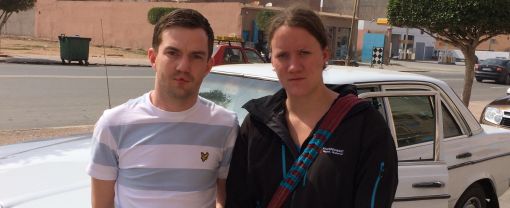
On their way to visit the family of late Said Dambar tonight, a Norwegian group was told by police that they were not allowed to leave the hotel.
"We insisted several times to cross the street from the hotel, where a car was waiting for us. But they aggressively refused us to leave", Christina Beck Jørgensen stated.
“They yelled at us stating that we could be robbed by criminals in the street, that there were no police patrols, and that they therefore could not allow us to leave the hotel”, she said.
The incident took place late at night, 16 April, while the streets were still heavily patrolled. Jørgensen and her co-traveler was then about to meet the relatives of the Saharawi Said Dambar, who was shot and killed by a policeman in 2010.
“We have never seen this many police officers at one place. The idea that we are not allowed to visit our friends for our own safety seems odd, as there seem to be by far more officers than civilians in the city”, stated Jørgensen.
“In Boujdour there were literally hundreds of policemen outside the place we stayed”, stated Johnny Håvik of the Norwegian union of energy workers, Industri Energi.
The group was witness to several demonstrations in Boujdour and El Aaiun the last three days. On one occasion in Boujdour, the police forcefully tried to enter the house where they were located.
One of their hosts in Western Sahara is tonight sought by the police. This evening, the police came to his home to bring him in.
"We are concerned that Saharawis are sanctioned for receiving foreign delegations", Håvik underlined.
The reason for their visit to Western Sahara was to interview Saharawis regarding the plans of the oil company Kosmos Energy to drill for oil offshore the occupied territory, in violation of a key UN legal opinion on the matter. All Saharawis the group has met, have clearly rejected the Moroccan oil programme in Western Sahara.
The issue of Western Sahara is next week up for debate in the UN Security Council. Secretary-General Ban Ki-Moon stressed in his report to the Council that there is a need for permanent, independent monitoring of human rights violations in the territory -something which is opposed by Morocco and its ally France.
NY Check new Western Sahara poster!
“Try to Visit Western Sahara”…
The Security Council fails Western Sahara and international law
On 31 October 2025, a new resolution was adopted in the UN Security Council calling on the Saharawis to negotiate a solution that would entail their incorporation into the occupying power, Morocco.
Saharawis Demonstrate Against Trump Proposal
The United States has proposed in a meeting of the UN Security Council on Thursday that the occupied Western Sahara be incorporated into Morocco.
Skretting Turkey misled about sustainability
Dutch-Norwegian fish feed giant admits using conflict fishmeal from occupied Western Sahara. Last month, it removed a fake sustainability claim from its website.



